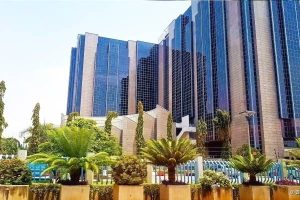CONTENTS
-
NIGERIA’S FX RESERVES HIT $41BN
-
FCCPC MOVES TO REGULATE DIGITAL MONEY LENDERS
-
NGX EQUITY TRANSACTIONS REACH 20-YEAR HIGH
-
INSURANCE REFORM ACT 2025
-
NIGERIA APPROVES $2.6BN DEBT PLAN
-
TINUBU TARGETS 7% GROWTH
-
HOW NIGERIAN MANUFACTURERS ARE REINVENTING FOR GROWTH
NIGERIA’S FX RESERVES HIT $41BN

CBN Reassures Public on Banking Sector Stability
Nigeria’s foreign exchange (FX) reserves have risen to $41 billion, their highest level since 2021, according to new data released by the Central Bank of Nigeria (CBN). The milestone comes amid reforms that are boosting investor confidence, oil production gains, and stronger foreign inflows.
Figures from the CBN show that the reserves climbed from $39.54 billion at the start of August to $41.00 billion by August 19, a 3.7% increase in less than three weeks. The turnaround represents the strongest accretion since December 2021, with over $3 billion added since mid-July.
Analysts attribute the rise to increased foreign portfolio investment, stable oil earnings, and improved non-oil exports. The CBN’s reforms, including liberalisation of FX inflows, tighter monetary policy, and enhanced diaspora remittance channels, have also been credited for the boost.
The reserves build-up has been accompanied by naira stability and four consecutive months of easing inflation, with the July rate at 21.88%, down from 22.22% in June. Oil output rose marginally in July to 1.51 million barrels per day, meeting OPEC+ quota for the third time this year.
Economists say the stronger reserves position will help the CBN defend the naira, reduce speculative pressure, and bolster investor confidence. “A robust reserve is critical to exchange rate stability and inflation control,” said Dr. Muda Yusuf, Director of the Centre for the Promotion of Private Enterprise.
Meanwhile, the CBN has moved to calm public concerns over unverified reports suggesting weakness in the banking sector. In a statement, CBN Acting Director of Corporate Communications, Hakama Sidi-Ali, reaffirmed that Nigerian banks remain “safe and sound,” urging customers to disregard rumours and continue normal banking transactions.
The clarification followed reports by the apex bank’s special investigator linking former CBN governor Godwin Emefiele to the controversial acquisition of two banks through proxies. The CBN stressed that depositors’ funds remain secure and that it remains committed to ensuring financial system stability.
With reserves at a four-year high and policy reforms gaining traction, market watchers expect further strengthening of Nigeria’s external position, though they caution that sustaining gains will depend on steady oil output, non-oil export growth, and maintaining investor confidence.
FCCPC ENFORCES DIGITAL LENDING RULES

The Federal Competition and Consumer Protection (FCCPC) Digital, Electronic, Online, Non-Traditional Consumer Lending Regulations 2025, introduced strict rules for digital lenders, requiring mandatory registration, transparent fee disclosures, and bans on accessing private customer data like contact lists. Key provisions include stringent penalties for non-compliance, data privacy mandates under the Nigerian Data Protection Act 2023, restrictions on unfair practices, and requirements for fair competition, especially in the airtime and data lending sector. These regulations aim to combat unethical practices and enforce ethical conduct within Nigeria’s digital lending landscape.
Key Aspects of the FCCPC Regulations
- Mandatory Registration:
All digital lenders, including fintechs and mobile money operators, must register with the FCCPC and receive approval to operate.
- Transparency and Fair Practices:
Lenders must provide clear information on interest rates, fees, and repayment terms before a consumer accepts a loan. Unfair contract terms and hidden fees are prohibited.
- Data Privacy:
The regulations explicitly ban lenders from accessing borrowers’ contact lists, call logs, and personal files, ensuring compliance with data protection laws.
- Penalties for Non-Compliance:
Lenders face significant fines, potentially up to ₦100 million or 1% of their annual turnover, for violations.
- Fair Competition:
Telecommunication companies providing airtime/data lending services must now work with at least two partners, including one locally owned company, to promote fair competition.
- Enforcement:
The FCCPC can permanently delist non-compliant digital lenders, leading to permanent prohibition and potential prosecution.
The regulations broadly cover:
- Direct Digital Lenders: Companies offering cash or non-cash credit via digital platforms.
- Fintech Companies: Any fintech involved in the digital lending value chain.
- Telecommunication Companies: Providers offering airtime or data-based credit services.
- Third-Party Vendors: Any entity involved in the consumer lending process.
How to Comply
- Register with the FCCPC:
Complete and submit the required registration forms, including details on your business, software applications, funding, and operational license.
- Provide a Data Protection Impact Assessment (DPIA):
Submit a DPIA as part of the registration process.
- Update Apps and Operations:
Ensure all digital lending applications comply with the new regulations, particularly regarding data access.
- Maintain Records:
Keep accurate records and respond to consumer complaints within strict timelines.
- Patronize Approved Lenders:
Consumers should only use digital lenders approved by the FCCPC to avoid illegal operations and potential victimization.
NGX EQUITY TRANSACTIONS HIT 18-YEAR HIGH

Recent news indicates a significant surge in equity transactions on the Nigerian Exchange Limited (NGX), reaching a total of N6 trillion within the first seven months of 2025. This marks the highest transaction volume recorded since 2007, and is double the N3 trillion recorded in the entire year of 2024.
Factors Contributing to the Surge
This substantial increase in trading activity can be attributed to several factors, including:
- Strong Corporate Earnings: Reports of stronger-than-expected corporate earnings have fueled investor optimism and encouraged market participation.
- Government Policy Reforms: Initiatives such as the removal of fuel subsidies and the unification of exchange rates have fostered a more conducive investment climate, attracting both domestic and foreign investors.
- Declining Yields: Reduced yields in the domestic debt market have further bolstered the attractiveness of the equity market.
Investor Participation
Domestic investors have been the primary drivers of this increased activity, contributing N4.726 trillion, or 78.67% of the total transactions. Foreign investors accounted for N1.281 trillion, representing 21.33% of the total.
Note: It’s important to differentiate between gross transaction values and net inflows/outflows. While foreign investors accounted for 21.33% of the total transaction value, foreign inflows totaled N609.73 billion against outflows of N671.56 billion during the same period, indicating a net outflow.
Significance of the Surge
This surge in equity transactions highlights the growing dynamism and potential of the Nigerian capital market. The increased activity suggests that the market is playing a more significant role in mobilizing capital for businesses and contributing to overall economic growth.
Concerns and Challenges
However, it’s important to acknowledge some existing concerns and challenges:
- Impact of Global Events: Upcoming US tariffs and evolving US inflation expectations could potentially trigger shifts in global capital flows and impact the Nigerian market.
- Rising Energy Costs: Increasing energy costs continue to pose a significant challenge to the manufacturing sector and could affect future profitability.
INSURANCE REFORM ACT 2025

Tinubu approves NIIRA, marking a new era for the sector
In a landmark move that promises to reshape the financial landscape of Africa’s largest economy, President Bola Ahmed Tinubu has signed into law the Nigeria Insurance Industry Reform Act (NIIRA) 2025. This monumental legislation, arriving more than two decades after the Insurance Act of 2003, ushers in a new era of growth, innovation, and global competitiveness for Nigeria’s insurance sector.
The Act represents more than just a legal reform: it is a statement of intent that Nigeria is ready to modernize its financial services industry, strengthen consumer trust, and unlock the vast untapped potential of an industry that currently contributes less than 1% to GDP.
For nearly two decades, Nigeria’s insurance industry has operated under an outdated and fragmented legal framework, governed by multiple laws including the Insurance Act 2003, Marine Insurance Act, Motor Vehicles (Third Party Insurance) Act, National Insurance Corporation of Nigeria Act, and the Nigeria Reinsurance Corporation Act.
These statutes had become increasingly obsolete, unable to match the pace of Nigeria’s evolving economy, the demands of a young and fast-growing population, or the digital disruption reshaping global finance.
The signing of the NIIRA 2025 finally delivers the comprehensive overhaul stakeholders have been demanding, positioning the insurance industry as a critical enabler of Nigeria’s economic growth and financial stability.
Nigeria’s insurance penetration remains among the lowest in the world at 0.5%, compared to South Africa’s 11% and far below the African average. With a GDP rebased to over ₦372 trillion ($243 billion) and a population projected to exceed 230 million by 2030, the growth potential is enormous.
The NIIRA 2025 is designed to unlock this potential by:
- Strengthening market confidence through enhanced regulation and consumer protection.
- Expanding access to underserved communities via micro-insurance, agricultural insurance, and takaful products.
- Driving innovation through fintech and Insurtech collaborations.
- Reinforcing capital adequacy, ensuring insurers are financially robust and capable of meeting obligations.
If effectively implemented, experts believe the new law could double insurance penetration by 2030, creating thousands of jobs and channelling long-term funds into infrastructure and development projects.
Framework Characteristics: A More Agile, Global-Standard Law
One of the defining features of NIIRA 2025 is its departure from the rigid, prescriptive style of the repealed Insurance Act 2003.
Instead, the new Act adopts a framework approach, setting broad principles while leaving detailed requirements to regulations and policy directives. This flexibility:
- Enables quicker adaptation to market changes.
- Reduces the need for frequent legislative amendments.
- Aligns Nigeria with international best practices in insurance supervision.
By empowering the National Insurance Commission (NAICOM) to issue guidelines, adjust capital requirements, and intervene swiftly in distressed companies, NIIRA 2025 provides a dynamic, risk-sensitive regulatory environment that supports both growth and stability.
Key Highlights of NIIRA 2025
The Act introduces a wide range of reforms designed to address systemic weaknesses and unlock long-term potential:
- Consolidation of Insurance Laws: Unifies previously fragmented statutes into one comprehensive framework.
- Risk-Based Capital & Revised Minimum Capital Requirements: Introduces modern standards that reflect each insurer’s business model and risk profile.
- Compulsory Insurance Enforcement: Strengthens compliance in areas such as third-party motor, government assets, and employee coverage.
- Expanded Third-Party Motor Coverage: Now includes road infrastructure damage, passengers in commercial vehicles, and vicarious liability for goods transporters.
- Financial Inclusion: Recognizes micro-insurance, takaful, and agricultural insurance, expanding reach to rural and low-income populations.
- Consumer Protection Fund: Establishes a safety net to safeguard policyholders if insurers fail.
- Holding Companies Regulation: Requires non-operating holding companies to register and be supervised by NAICOM, curbing governance abuse.
- Technology & Innovation Recognition: Legalizes electronic submissions, virtual meetings, and fintech-driven distribution models.
- Market Conduct & Governance: Enhances transparency, ethical practices, and fair competition.
- Stricter Regulatory Enforcement: Provides NAICOM with broader sanction powers, including license suspension and imprisonment for illegal operators.
Implications for Stakeholders
- For Consumers: Greater trust, stronger protections, and wider access to affordable insurance products.
- For Insurers: A more competitive, innovation-driven marketplace with stronger capital requirements and governance standards.
- For Government & Economy: A revitalized insurance industry that can mobilize domestic savings, finance infrastructure, and strengthen Nigeria’s resilience to economic shocks.
- For Investors: A clearer, more predictable regulatory environment that meets global standards, making Nigeria’s insurance market more attractive to foreign capital.
NIGERIA APPROVES $2.6BN DEBT PLAN

Government to Refinance Power Sector Debt, Boost Stability
Nigeria has taken a significant step toward addressing one of its most pressing structural challenges: the persistent instability in the electricity sector. Last week, the federal government approved a phased plan to refinance ₦4 trillion ($2.61 billion) in accumulated electricity sector debt, a move that could redefine the trajectory of the nation’s power supply and unlock long-stalled investment in the energy space.
Why does this matter?
For years, the power sector has been suffocated by mounting debts, with much of it owed to 27 power generation companies for invoices dating back to 2015–2023. This huge financial backlog has created a trust deficit between the government, distribution companies, and investors. The result? Chronic power outages, underinvestment in infrastructure, and a widening gap between electricity demand and supply in Africa’s most populous country.
By approving this plan, the government is not just paying off arrears, it is signalling a commitment to restore confidence in the sector, foster liquidity, and stabilize operations across the value chain.
Key Highlights of the Plan:
- Refinancing will be implemented within 3–4 weeks, overseen by the Debt Management Office.
- Instruments such as bond issuances and structured repayment models will spread out liabilities sustainably.
- Aligned reforms include a 35% cut in electricity subsidies and tariff adjustments for urban consumers, reforms expected to save the government ₦1.1 trillion ($718.58 million) annually.
- These measures also tie into President Bola Tinubu’s broader energy reform agenda, aimed at ensuring long-term sustainability of the power industry.
This debt refinancing is not happening in isolation. It is part of a larger recalibration of Nigeria’s energy policy, balancing fiscal realities with the urgent need for reliable electricity. While subsidy cuts and tariff increases may feel burdensome for consumers in the short term, they create room for a more transparent, investor-friendly market in the long term.
The real test, however, will be implementation and accountability. Will the refinancing plan lead to actual infrastructure upgrades? Will liquidity reach the generation companies quickly enough to improve output? And most importantly, will Nigerians see meaningful improvements in electricity supply in their daily lives?
What this means for stakeholders:
- Investors: Renewed confidence and a stronger case for fresh capital inflows into the power sector.
- Businesses: Potential relief from erratic electricity supply that has long inflated operating costs.
- Households: The promise of more stable power, though balanced with higher tariffs in some regions.
- Government: A fiscal breather from subsidy burdens, freeing resources for other national priorities.
In many ways, this decision also ties into Nigeria’s broader sustainability and ESG commitments, stabilizing the power sector is not just an economic necessity but also a prerequisite for driving renewable energy investments and achieving environmental targets in the years ahead.
As Nigeria takes this bold step, one thing is clear: solving the electricity conundrum is central to unlocking the nation’s economic potential.
TINUBU TARGETS 7% GROWTH

Nigeria sets 2027 economic goal under new reform agenda.
President Bola Ahmed Tinubu has set a bold target for Nigeria’s economy: 7% annual growth by 2027, as part of his vision to lift millions from poverty and quadruple GDP by 2030.
Since taking office in May 2023, Tinubu has launched sweeping reforms including subsidy removals and two-naira devaluations, to restore fiscal discipline and attract investment. While these moves boosted investor confidence, they also triggered Nigeria’s worst cost-of-living crisis in decades, with inflation eroding household incomes.
Current Growth Outlook
Nigeria’s economy grew 3.13% in Q1 2025, following a GDP rebasing that set the economy’s size at ₦372.8 trillion ($243.5 billion). Still, growth lags behind the administration’s targets. The World Bank projects 3.6% growth in 2025 and 3.8% by 2027, well below Tinubu’s ambitions.
Key Challenges
Tinubu cited low public savings and weak investment, currently just 5% of GDP, as major constraints. He ordered a review of revenue retentions by agencies like FIRS, Customs, and NNPC, whose deductions critics argue limit funds for infrastructure, education, and healthcare.
Private Sector Confidence
With private enterprise accounting for over 60% of GDP, the administration is prioritizing policies to spur investment in manufacturing, agriculture, technology, and renewables. “We must optimize every available naira,” Tinubu said, stressing that reforms aim to create a stable, predictable business climate.
Tinubu’s revised 7% growth target is more ambitious than his initial 6% goal, though well above multilateral forecasts. Achieving it will require deep governance reforms, stronger capital allocation, and productivity gains, while protecting vulnerable Nigerians from inflationary shocks.
If successful, Nigeria could accelerate its path toward becoming a leading emerging economy by 2030. But experts caution that insecurity, infrastructure gaps, and implementation risks remain significant hurdles.
FROM CRISIS TO REINVENTION:

How Nigerian Manufacturers Are Reinventing for Growth
The Nigerian manufacturing sector has long been defined by resilience in the face of daunting challenges, power shortages, infrastructure gaps, policy inconsistency, and currency instability. Yet, few moments in recent history tested the industry as severely as the 2023–2024-naira devaluations.
For many companies, this was a breaking point. For others, it became the catalyst for transformation, ushering in a new era of localisation, supply chain innovation, and operational reinvention.
The Breaking Point: When the Naira Crumbled
For veterans like Lekan Aluko, Chief Supply Officer of Chemical and Allied Products (CAP), the turbulence after the 2024-naira devaluation was unprecedented.
“From a supply chain point of view, it was the worst period I’ve ever witnessed,” Aluko recalled, describing how orders were cancelled within minutes as forex rates fluctuated wildly.
The government’s currency reforms, aimed at liberalising the economy and attracting investors, sent shockwaves through the sector. Manufacturers, heavily reliant on imports, faced soaring costs, uncertainty, and in some cases, paralysis.
According to the Manufacturers Association of Nigeria (MAN), nearly 800 companies shut down in 2023. Global players like Procter & Gamble, Unilever, GSK, PZ Cussons, Bayer, and Sanofi scaled back or exited, frustrated by persistent volatility.
Why Devaluation Was Inevitable
For years, the naira was pegged artificially high, discouraging exports, limiting forex inflows, and worsening shortages as oil production declined. By 2023, the choice was stark: maintain an unsustainable peg or reset the economy through painful reforms. President Bola Tinubu chose the latter.
Localisation as a Survival Strategy
Amid the chaos, some firms turned crisis into opportunity.
At CAP, a key player in paints, the company shifted from importing calcium carbonate to sourcing it domestically. Within 10 months, results were clear:
- 90% of inputs sourced locally
- 60% cost savings
- Consumer prices kept below “real inflation”
“If we hadn’t localised, we’d have raised prices by another 50%,” said CEO Bolarin Okunowo.
This mirrors a wider trend: MAN, data shows local raw material usage rose to 57.1% in 2024, up from 52% in 2023.
Hurdles Along the Way
Localisation is promising but not painless. Challenges include:
- Supplier capacity gaps
- Infrastructure bottlenecks (power and transport)
- Regulatory uncertainty
Still, executives remain cautiously optimistic, especially with a new tax law set for 2026 to streamline compliance.
Signs of Stabilisation
Despite short-term pains, the naira has begun to stabilise and confidence is inching back. Business sentiment surveys point upward, offering a glimmer of hope.
“Business confidence has been going up in the measures that we track,” Gendis said. “That shows us things are trending in the right direction.”
SOURCES: Nariametrics, Businessday, istock images, Punch newspaper, Premium Times, Leadership News, Vanguard News, Daily Times Nigeria, Linda Ikeji’s Blog.
DISCLAIMER
This publication is produced by Centrum Finance Company Limited solely for the information of users who are expected to make their own investment decisions without undue reliance on any information or opinions contained herein. The opinions contained in the report should not be interpreted as an offer to sell, or a solicitation of any offer to buy any investment. Whilst every care has been taken in preparing this document, no responsibility or liability is accepted by any member of the Company for actions taken because of the information provided in this publication

